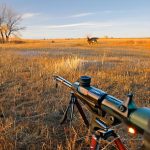Your cart is currently empty!

michigan deer hunting lease

Deer hunting is a popular pastime in Michigan, with thousands of hunters taking to the woods each year in pursuit of the state’s abundant deer population. While public land is available for hunting, many hunters opt to lease private land for a variety of reasons. A hunting lease is an agreement between a landowner and a hunter or group of hunters, granting them exclusive access to the land for hunting purposes. In Michigan, deer hunting leases offer numerous benefits and opportunities for hunters.
Key Takeaways
- Michigan deer hunting leases provide hunters with exclusive access to private land for hunting.
- Leasing land for deer hunting in Michigan offers benefits such as increased privacy, better hunting opportunities, and reduced competition.
- When choosing a Michigan deer hunting lease, factors to consider include location, size, terrain, and access to water sources.
- Types of deer hunting leases available in Michigan include annual leases, seasonal leases, and day leases.
- To find the best Michigan deer hunting lease, hunters can use online resources, ask for referrals, and visit local hunting clubs and associations.
- Rules and regulations for hunting on leased land in Michigan include obtaining proper licenses, following bag limits, and respecting property boundaries.
- Tips for a successful Michigan deer hunting lease experience include scouting the land, setting up stands and blinds, and practicing good hunting ethics.
- The cost of Michigan deer hunting leases varies depending on factors such as location, size, and amenities, but hunters can expect to pay several hundred to several thousand dollars per year.
- Legal considerations for Michigan deer hunting leases include liability insurance, lease agreements, and compliance with state and federal hunting laws.
- Frequently asked questions about Michigan deer hunting leases include topics such as lease duration, lease renewal, and lease termination.
Benefits of Leasing Land for Deer Hunting in Michigan
One of the main benefits of leasing land for deer hunting in Michigan is the access to private land. Public land can become crowded during hunting season, making it more difficult to find a prime hunting spot. By leasing private land, hunters have exclusive access to the property, ensuring a more peaceful and enjoyable hunting experience.
Leasing land also increases the chances of success. Private land often has less hunting pressure than public land, allowing deer to roam freely and increasing the likelihood of encountering a trophy buck. Additionally, hunters can strategically manage the land for hunting purposes, creating food plots, planting cover crops, and implementing other habitat improvements to attract and hold deer.
Another advantage of leasing land for deer hunting in Michigan is the potential for exclusive hunting rights. Some leases grant hunters sole access to the property, meaning they don’t have to worry about competing with other hunters or sharing their hunting spot. This exclusivity can lead to a more relaxed and rewarding hunting experience.
Factors to Consider When Choosing a Michigan Deer Hunting Lease
When choosing a Michigan deer hunting lease, there are several factors to consider. The location of the property is important, as it should be within a reasonable distance from your home or desired hunting area. A long commute can be inconvenient and may limit your ability to hunt frequently.
The size of the property is also a crucial factor. Larger properties offer more room to explore and increase the chances of encountering deer. However, smaller properties can still be productive if they are well-managed and have the right habitat features.
The terrain and habitat of the property should also be taken into account. Look for properties with a mix of open fields, wooded areas, and water sources, as these provide ideal habitat for deer. Additionally, consider the availability of game on the property. Look for signs of deer activity, such as tracks, rubs, and scrapes, to determine if the property is likely to hold deer.
It’s also important to carefully review the lease terms and conditions before signing. Consider factors such as lease duration, hunting restrictions, and any additional fees or requirements. Make sure the lease aligns with your hunting goals and preferences.
Types of Deer Hunting Leases Available in Michigan
There are several types of deer hunting leases available in Michigan to suit different needs and preferences. Annual leases are the most common type and typically last for one year. These leases provide hunters with exclusive access to the property for an entire hunting season.
Seasonal leases are shorter-term leases that may span a specific portion of the hunting season, such as archery season or firearm season. These leases are ideal for hunters who only want to hunt during a specific time period.
Day leases are another option for hunters who prefer a more flexible arrangement. These leases allow hunters to access the property for a single day or weekend, providing a convenient option for those who can’t commit to a longer-term lease.
Group leases are popular among friends or hunting clubs who want to lease land together. These leases allow multiple hunters to share the cost and responsibilities of leasing land, while still providing exclusive access for hunting.
How to Find the Best Michigan Deer Hunting Lease
Finding the best Michigan deer hunting lease requires some research and effort. One of the best ways to start is by researching online. There are several websites and platforms that specialize in connecting hunters with landowners offering hunting leases. These websites often provide detailed information about the properties, including photos, maps, and lease terms.
Another way to find a good hunting lease is by asking for recommendations from other hunters. Talk to fellow hunters in your area or join online hunting forums to get insights and recommendations on leases that have been successful for others.
Attending hunting expos and events can also be a great way to find hunting leases. Many landowners and lease managers attend these events to showcase their properties and connect with potential lessees. Take the opportunity to speak with them directly and ask any questions you may have.
Lastly, consider contacting local hunting clubs and organizations. They often have connections with landowners who are willing to lease their property for hunting purposes. These clubs may also have their own leased properties that members can access.
Rules and Regulations for Hunting on Leased Land in Michigan
When hunting on leased land in Michigan, it’s important to be aware of the rules and regulations that apply. Michigan has specific hunting laws that must be followed, regardless of whether you are hunting on public or private land. These laws include regulations on bag limits, hunting seasons, and weapon restrictions.
In addition to state laws, leased properties may have their own rules and regulations that hunters must adhere to. These rules can vary depending on the property and lease agreement, so it’s important to thoroughly review the lease terms before hunting. Common lease-specific rules may include restrictions on the number of hunters allowed on the property, specific hunting methods or equipment that can be used, and designated areas for hunting.
It is crucial for hunters to follow all rules and regulations when hunting on leased land. Failure to do so can result in legal consequences and may lead to the termination of the lease agreement. Respecting the landowner’s rules and property boundaries is not only important for legal reasons, but also for maintaining a positive relationship with the landowner and ensuring the longevity of the lease.
Tips for a Successful Michigan Deer Hunting Lease Experience
To make the most of your Michigan deer hunting lease experience, there are several tips to keep in mind. Before hunting, take the time to scout the property and familiarize yourself with the terrain and deer patterns. Look for signs of deer activity, such as tracks, rubs, and scrapes, and identify potential stand locations.
Respect the land and other hunters by practicing ethical hunting behavior. Follow all rules and regulations, clean up after yourself, and be considerate of other hunters on the property. Remember that you are a guest on someone else’s land and treat it with care.
Communication with the landowner or lease manager is key to a successful lease experience. Keep them informed of your plans and any issues or concerns you may have. Building a good relationship with the landowner can lead to future lease opportunities and may even result in additional hunting privileges.
Lastly, be prepared for all weather conditions. Michigan’s weather can be unpredictable, so make sure you have appropriate clothing and gear to stay comfortable in various conditions. This includes dressing in layers, wearing waterproof clothing, and having a reliable shelter or blind.
Cost of Michigan Deer Hunting Leases: What to Expect
The cost of Michigan deer hunting leases can vary depending on several factors. On average, annual leases in Michigan can range from $500 to $2,000 per year. However, prices can be higher for properties with prime hunting opportunities or exclusive access.
Factors that can affect the cost of a lease include the size and quality of the property, its proximity to popular hunting areas, and the demand for leases in that particular region. Additionally, leases that offer exclusive hunting rights or additional amenities may come at a higher price.
When considering the cost of a lease, it’s important to budget accordingly. Factor in not only the lease cost, but also any additional expenses such as hunting licenses, equipment, and travel costs. It’s also a good idea to have a contingency fund in case of unexpected expenses or emergencies.
Legal Considerations for Michigan Deer Hunting Leases
When entering into a Michigan deer hunting lease, it’s important to have a written lease agreement in place. This agreement should outline the terms and conditions of the lease, including the duration, cost, and any specific rules or restrictions. Having a written agreement helps protect both the landowner and the hunter by clearly defining their rights and responsibilities.
Liability and insurance considerations are also important when leasing land for hunting purposes. Hunters should ensure they have appropriate liability insurance coverage in case of accidents or injuries that may occur on the leased property. Landowners may also require hunters to provide proof of insurance before entering into a lease agreement.
Understanding property rights and boundaries is another legal consideration when hunting on leased land. Hunters should familiarize themselves with the property boundaries and respect neighboring properties. Trespassing on adjacent properties can result in legal consequences and damage relationships with neighboring landowners.
Frequently Asked Questions About Michigan Deer Hunting Leases
1. Can I hunt on public land in Michigan without a lease?
Yes, public land is available for hunting in Michigan without a lease. However, leasing private land can provide exclusive access and increased chances of success.
2. How do I know if a lease is worth the cost?
Consider factors such as the size and quality of the property, its location, and the availability of game. Additionally, read reviews or speak with other hunters who have leased the property to get their insights.
3. Can I bring guests or family members on a leased property?
This depends on the specific lease agreement. Some leases allow guests or family members to hunt on the property, while others may restrict access to only those named on the lease.
4. What happens if I violate the lease rules or regulations?
Violating lease rules or regulations can result in the termination of the lease agreement and potential legal consequences. It’s important to thoroughly review and follow all rules and regulations to avoid any issues.
5. Are there any additional resources for hunters interested in leasing land for hunting purposes?
Yes, there are several resources available for hunters interested in leasing land for hunting purposes in Michigan. The Michigan Department of Natural Resources website provides information on hunting leases and public land options. Additionally, online hunting forums and websites dedicated to hunting leases can provide valuable insights and connections to landowners offering leases.
If you’re interested in Michigan deer hunting leases, you might also find this article on trapping rabbits from Old Oak Syndicate intriguing. It provides valuable insights and techniques on how to effectively trap rabbits, which can be a great addition to your hunting experience. Check out the article here to learn more. Additionally, if you’re looking to diversify your hunting skills, Old Oak Syndicate offers another informative piece on hunting raccoons during the day. Discover effective strategies and tips by reading the article here. Lastly, for those interested in hunting grouse with a .22 caliber rifle, Old Oak Syndicate has an article that covers this topic in detail. Learn about the nuances and techniques involved by visiting this link.
FAQs
What is a Michigan deer hunting lease?
A Michigan deer hunting lease is an agreement between a landowner and a hunter or group of hunters that allows the hunters to hunt on the landowner’s property for a specified period of time.
What are the benefits of a Michigan deer hunting lease?
A Michigan deer hunting lease provides hunters with exclusive access to private land, which often results in better hunting opportunities and less competition from other hunters. It also provides landowners with additional income and helps them manage their property’s wildlife population.
How do I find a Michigan deer hunting lease?
You can find Michigan deer hunting leases by searching online classifieds, contacting local hunting clubs or associations, or reaching out to landowners directly.
What should I look for in a Michigan deer hunting lease?
When looking for a Michigan deer hunting lease, you should consider the size and location of the property, the number of hunters allowed, the length of the lease, and any additional rules or regulations set by the landowner.
What are the rules and regulations for Michigan deer hunting leases?
The rules and regulations for Michigan deer hunting leases vary depending on the landowner and the specific lease agreement. However, hunters are generally required to follow all state hunting laws and regulations, as well as any additional rules set by the landowner.

Herb has been a longtime lover of the outdoors. Whether it be hunting, camping, fishing or just getting outside to reset. Proud father and animal lover. Bourbon anyone?

by
Tags:
Comments

Categories
- Big Game Hunting (301)
- Deer (202)
- Reviews (3)
- Shooting (16)
- Slingshot (1)
- Small Game Hunting (42)
- Upland Hunting (126)
- Waterfowl Hunting (3)





Leave a Reply